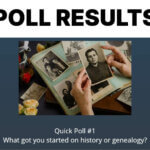 June has been and gone and what a month it’s been. This time I have a enormous collection for you as I came across so many fabulous articles.
June has been and gone and what a month it’s been. This time I have a enormous collection for you as I came across so many fabulous articles.
There’s articles on: preserving letters, photos, and the family bible, inheriting photos, Australia’s convict women, beginning genealogy, name collecting, tips for oral history, and what information are you missing out on? There’s also reminiscence therapy, sources, why you should take photos with a camera (not a phone), and whole heap more …
So grab yourself a cup of tea or coffee, get comfy, and enjoy some great reads.
As I mention every time, I find that reading blog posts helps me keep up with the latest news, products as well as what’s happening in general in the world of genealogy. And if you happen to already follow me on Facebook, Twitter, and to some extent Google+, you already know that I like to share with you the interesting things I read.
Preserving Old Family Letters
Having old family letters is a treasure and you should take care of them to ensure they are preserved. Melisaa Barker who is an archivist, professional genealogist and writes the ”A Genealogist in the Archives” blog, gives you tips on how to do this. Read the full article …
How to Overcome the Challenges of Inherited Photographs
Are you lucky enough to have inherited old family photos? While that is certainly a blessing, there are a lot of possibilities for additional challenges. Maybe some photos aren’t labeled so you don’t know who is in the photo. Maybe you have duplicates. Maybe you just have so many photos that the thought of doing something with them is pretty daunting. Jennifer from the Life Tale Books blog give some great advice for this very topic. Read the full article …
Take photos with a camera, for history’s sake
Phone cameras are handy, but they are devaluing photography. Paul Burrows has edited Australian Camera magazine, and he calls it the ‘snap, share and instantly forget’ mentality. “So many images are being lost because no thought is being given to how they’re stored or even retrieved,” he says. Read what else Paul has to say in the full article …
The ‘founding mothers’: the little-known story of Australia’s convict women
“Half the women landed in mainland Australia and half in Tasmania. Less than 2 per cent were violent felons. For crimes of poverty, they were typically sentenced to six months inside Newgate Prison, a six-month sea journey, seven to 10 years hard labour and exile for life. Clearly, the scope of their punishments far exceeded the scope of their crimes,” Deborah Swiss, the author of The Tin Ticket: The Heroic Journey of Australia’s Convict Women says. Read the full article …
Are You a Family Historian or a Name Collector?
Everyone’s answer to this question will vary, as it depends on WHY you are researching. Dick Eastman gives you his viewpoint on it. Read the full article …
Reminiscence Therapy: How Photos Can Help You Tell a Loved One’s Life Story
Photos are one of the best conversation starters; they help us remember to remember. According to the Alzheimer’s Association, images can be used for “reminiscence therapy.” In essence images unlock long-term memories and help catalyze meaningful conversations. Old photos can stimulate the brain and open the floodgates of memory. All of a sudden, there is a conversation happening that you never want to end! Use photos a memory triggers with your family, and see what stories emerge. Read the full article …
How to make an excellent oral history recording: top tips from an audio engineer
In this post Peter Kolomitsev, an audio engineer at the State Library of South Australia, provides tips to ensure excellent quality oral history recordings. Great tips, so be sure to read the full article …
Are You New to Genealogy?
Dick Eastman is one of the well-known personalities in the genealogy scene having been researching for over 35 years, and writing his genealogy newsletter for over 20! In this post he has compiled a list of links to articles that he’s written that are specific to those who are beginning the exciting journey of family history. Read the full article …
Giving Back to the Genealogical Community? Here’s Why You Should, and How You Can
Have you ever considered giving back to the genealogical community? Will from the Ancestral Findings blog writes … “When we give back to the community, we are making tracing family histories easier on others, and they, in turn, will give back and make our own searches easier on us.” He goes on to list numerous ways you can do so. Read the full article …
The Surprising Practice of Binding Old Books With Scraps of Even Older Books
For book-lovers or history-lovers, this is an interesting article, on the bookbinders practice of commonly using whatever materials they could get—which included entire manuscript pages. It’s a fascinating read and the pictures are amazing. Read the full article …
Are You Missing Most of the Available Genealogy Information?
Have you been only researching your family history online? When did you last go to, or get in touch with an archive or society to see what information they might have? We know that “it’s not all online”, but Dick Eastman says that “95% of genealogical records aren’t online”. Sure there’s billions that are, but think of what you’re missing if you’re not searching offline too. Read the full article …
Preserving Old Black Paper Photo Albums
Melissa from the Genealogist in the Archives blog has fabulous tips for those who have the old black paper photo albums, and it might not be what you think, so take a read. Read the full article …
5 Easy Steps to Preserving the Family Bible
One more from Melissa, and an important one for those who are fortunate enough to have a family bible. Just what is the best way to store it, to ensure it’s preservation? Melissa tells you. Read the full article …
3 Questions to Ask Yourself Before Getting DNA Testing for Genealogy
There’s no doubt that DNA is the hot topic in the genealogy world. But if you haven’t yet tested, but are sort of interested, there are there some very important questions to determine if having your DNA tested is truly for you. Read the full article …
Beginner Basics: What Makes a Good Source
Family trees, whether printed or hand-drawn, are sources, but are not hard proof of lineage. Why? Because the family tree is not recorded as close to the events as possible by first-hand witnesses. So what makes a good source? This article is a good reminder for all of us. Read the full article …








